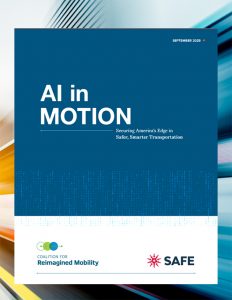AI in Motion: Securing America’s Edge in Safer, Smarter Transportation
September 8, 2025
AI is transforming how transportation systems are designed, governed, and operated, presenting a prime vector for saving lives, time, and money. AI-enabled transportation improves roadway safety by predicting collisions, identifying hazardous conditions, and enabling faster emergency responses. And, these technologies have already reduced injury claims by up to 92%, freight delivery times by 25%, and saved nearly $100 million annually for a global airline using an AI-based flight path optimization.
However, despite these benefits, the U.S. Department of Transportation has only recently begun incorporating AI into its regulatory actions. DOT ranks behind several federal agencies in the total number of AI-related rules to date, underscoring the need for stronger federal leadership in applying AI to transportation.
ReMo’s latest report analyzes AI applications and governance in transportation, connecting use cases with physical infrastructure required to scale and deploy the technology. The report considers energy and geopolitics into a cohesive strategy for national AI deployment—illuminating the national security implications of building transportation AI capabilities here in the US.
As China and the EU move forward in standard-setting and policy frameworks governing the deployment and implementation of AI systems, the United States’ approach remains fragmented and inconsistent. ReMo’s report identifies three key challenges to the widespread deployment of AI-enabled transportation systems and to securing future leadership: energy infrastructure resilience, regulatory fragmentation, and global standards and strategic competition.
Decisive and urgent action is needed to cement future American AI leadership. ReMo’s report lays out several guidelines for securing American leadership in and taking full advantage of AI-enabled transportation, which include:
- Prioritizing transportation AI as national infrastructure and as a security imperative.
- Investing in resilient energy, chip, and compute infrastructure.
- Adopting a national regulatory framework that enables safe, scalable deployment.
- Engaging assertively in global standards-setting to ensure democratic norms shape future mobility systems.
While the U.S. risks falling behind in AI’s next era—deployment—it can still redirect and maintain its leadership over the sector. ReMo’s recommendations can offer a path forward to overcome strategic challenges and ensure continued U.S. competitiveness and leadership in AI-enabled transportation.
Watch the report release here.

